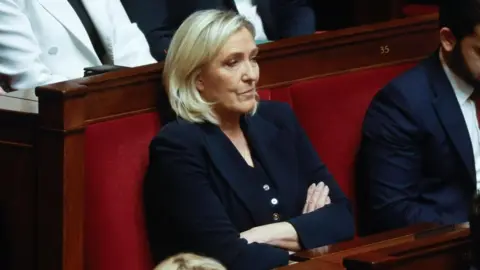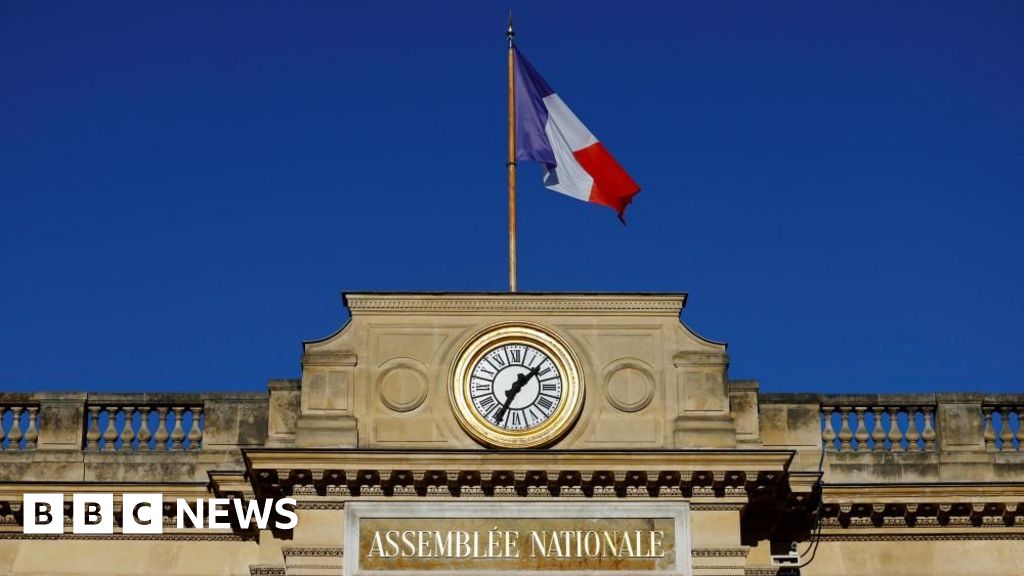 Reuters
ReutersShort of another surprise, France will once more be without a government on Wednesday.
That is when Michel Barnier, appointed by President Macron after July’s inconclusive parliamentary election, faces a no-confidence motion over the budget – a vote he will almost certainly lose.
As the left-wing MP Alexis Corbière put it in the National Assembly this afternoon: “That’s it for Barnier. He’s out of here.”
The arithmetic is merciless for the former Brexit negotiator, who now stands to end his career as the shortest-lived prime minister in France’s Fifth Republic.
From the start he has been leading an anomaly: a minority government whose very survival depended on the indulgence of its enemies.
In the National Assembly, Barnier could count on his own conservative group and the Macronites. But this centrist bloc has been easily outnumbered by a left-wing coalition on one side, and on the other the populist right of Marine Le Pen.
And when those two forces combine – as they will in Wednesday’s censure motion – then the numbers are too much, and Barnier must fall.
 Reuters
ReutersIt is a crisis that has been waiting to happen, but was deferred till now by long procedural haggling over the 2025 budget.
Shortly after taking office in September, he proposed a budget that promised €60bn (£49bn) in deficit reduction – necessary, he said, to satisfy Brussels and get the country’s finances back in shape.
But because he lacked a majority, his budget was then disfigured by opposition amendments – from both left and populist right – which removed taxes and introduced more spending, thus changing its essential nature.
After much parliamentary to-ing and fro-ing with the conservative dominated Senate, Barnier came back with a new text, or technically texts, because there is a social security budget as well as the overall budget.
But that version remains unacceptable to the opposition.
Marine Le Pen, who could save Barnier if she chose to, made a series of new demands, including removing a new tax on electricity, and restoring fully index-linked pensions).
Barnier gave ground – quite a lot in fact. But it wasn’t enough. And now Le Pen plans to pull the plug.
Barnier and his supporters have made much of their one good argument – the chaos scenario.
What responsible party leader, they said, could want to tip France into the uncertainty and instability of yet another government crisis?
 EPA
EPAWould Marine Le Pen really want to take the blame for the inevitable turbulence on the financial markets, the hike in borrowing costs, the spending cuts that would follow?
Her response has been to say that warnings of doom are exaggerated: there will be no catastrophe. Technically France might not have a budget (which it won’t if Barnier is ousted on Wednesday) but systems will kick in. The constitution allows for matters to be administered for a time by decree.
Up to a point she is right.
If Barnier falls, he will probably stay in power in a caretaker capacity while Macron (who is inconveniently in Saudi Arabia this week) seeks a replacement.
That could take weeks, as it did in the summer after Macron lost his disastrously mismanaged early elections and Gabriel Attal stayed as caretaker until September.
In the meantime a special law could be passed carrying the 2024 budget into 2025, so that civil servants are paid and hospitals meet their heating bills. An eventual new government would then pass a retrospective “corrective” budget to set the books straight.
But the bigger picture is much more serious.
The original political crisis triggered by Macron’s June dissolution of parliament has been exposed as the chronic disaster it always was. There is no “fix” with a “consensus-building” negotiator of the Barnier mould.
Barnier was the best the president could offer. And if Barnier has failed, it shows the situation is truly intractable.
No new elections can be called until July. No stable government is conceivable. Some say the only answer is for Macron himself to go. Until now that’s been regarded as political fantasy.
But how much more of this is France prepared to take?



